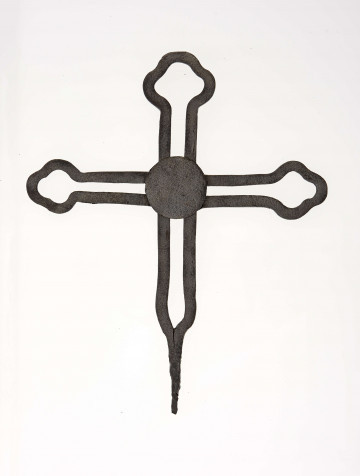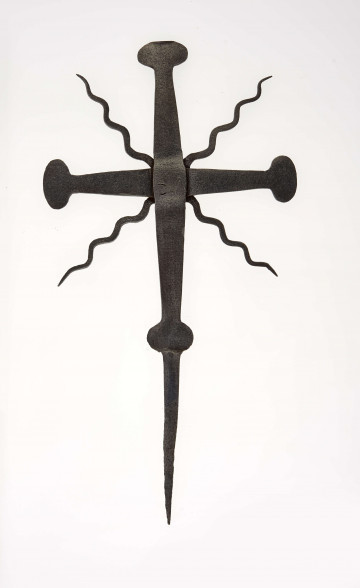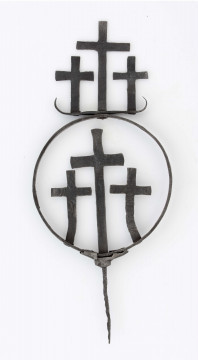
Cross
1901 — 1920
National Museum in Lublin
Part of the collection: Folk craft of the Lublin Region (19th/20th c.)
The section of the national road running between Janów Lubelski and Frampol, where over sixty crosses and chapels with statues of saints stand along its 18 km length: Francis, Tekla, Matthias, John of Nepomuk (see E/16816/ML), and the Sorrowful Christ (see E/357/ML, E/358/ML), is unique in Poland. They are almost all located on one side of the route and their presence is explained by the foundation of pilgrims heading from the Frampol area to the Marian sanctuary in Janów. The wooden roadside crosses present different forms. They include Latin crosses, plague crosses, crosses erected to defend against epidemics, called karawaka (see E/6390/ML), and the so-called "Krzemień" crosses, characteristic for this area. The latter took their name from the village of Krzemień, with which their author, blacksmith Jan Paryś (1871-1950), was associated.
The son of Walenty and Rozalia née Jargiłów, he learnt his craft during his stay in the tsarist army (1892-1898), in the vicinity of Lviv, where he was a senior blacksmith for four years, although he had already learnt the secrets of the profession before the army. Between 1898/1899 and 1947, he made original iron openwork crosses, not found in other regions of Poland. They were placed on top of wooden gables. The main structure consisted of an iron bar cut and split into oval and quadrilateral openings, to which side arms were attached by welding. All four ends of the cross were also fitted with openwork grommets, which created the so-called braided effect. Additional decoration could be a rooster on the top, often movable (see E/379/ML, E/16369/ML), or a crescent at the base (see E/8115/ML).
Crosses varied slightly - the presence and size of the crescent or the shape of the cockerel and the number of feathers in the tail. They were distributed almost all over the county, with the eastern and central parts predominating. They also quickly found more or less successful imitators. As the result of field investigations seventy-one openwork crosses were found, either fully or partially reconstructed, including forty-seven made by a flint smith.
Author / creator
Dimensions
cały obiekt: height: 41 cm, width: 94 cm
Object type
cross
Technique
forging
Material
iron
Creation time / dating
Creation / finding place
Owner
The National Museum in Lublin
Identification number
Location / status

1901 — 1920
National Museum in Lublin

1890 — 1910
National Museum in Lublin

1863 — 1868
National Museum in Lublin
DISCOVER this TOPIC
National Museum in Szczecin
DISCOVER this PATH
Educational path